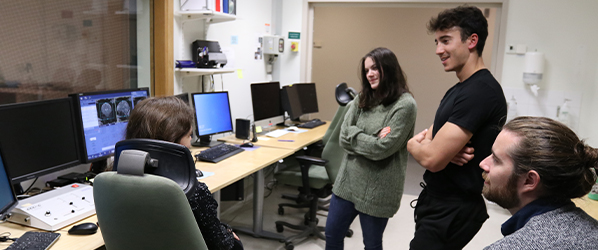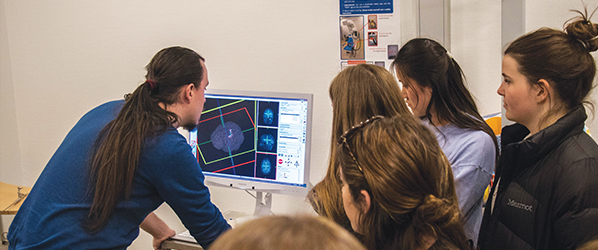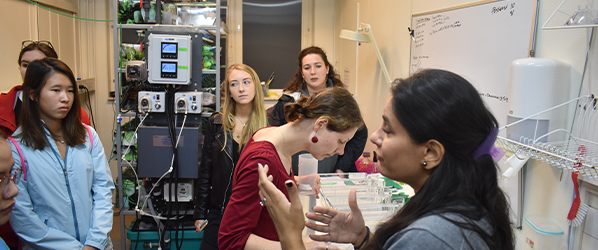Neuroscience
How do we understand the interplay between human emotions, addictive processes, and the relationships we form with one another? As humans, emotions are intrinsic to our socialization, and influence our cognition and behavior.
Moreover, extreme problems with emotional processing may contribute to the development of addictive disorders. And together, all of these processes both affect, and are affected by, our familial, friendly, and romantic relationships.
Study and research the underlying neural networks linked to the experience, understanding, and expressions of complex processes such as emotion, addiction, and human relationships.

Core Courses
Cognitive Neuroscience of Addiction
Fall/Spring 3 Credits
Addictive disorders involve complex interactions among neurobiological, psychological, environmental, and sociocultural features and can reflect problems across a range of substances or behaviors. From drug abuse, to gambling, to the more controversial sex addiction and food addiction, problems with addiction share important commonalities in neurocircuitry. In this course, we will adopt a multidisciplinary lens and review contemporary research involving techniques such as brain stimulation and real-time neurofeedback to explore addiction processes and strategies for treatment.
Loving Brain: The Neuroscience of Relationships, The
Fall/Spring 3 Credits
What is the nature of love? In this course we will explore the neuroscientific research on social relationships. We will investigate a wide range of relationships, including, but not limited to, parent-sibling relationships, friendships, romantic relationships, as well as social ostracism and rejection. As we examine these relationships through an evolutionary lens, we consider primate brain evolution and the evolutionary functions and adaptive values of social connections. A fundamental question will be whether neuroscientific research enhances our understanding of social relationships. Furthermore, we will investigate how variation in the cultural emphasis on independence and interdependence relates to differences in brain activity and social relationships across differing cultures. A principal framework for our inquires will be to understand the implications this research has for health and wellbeing.
Neuroscience of Emotion
Fall/Spring 3 Credits
How do we understand the interplay of human emotions and their neural networks? This course applies findings from the interdisciplinary field of neuroscience and the psychological study of cognition, emotion, and personality. Basic, complex, and social emotions are explored from the perspective of, for example, the subjective experience of emotion, non-conscious processes, and how emotions are interpreted, expressed, or regulated. Affective systems, neural networks, and their relationship to cognitive processes such as attention, learning, memory, and decision making are addressed. Where relevant, human brain imaging findings, pathological conditions, treatment, and cultural perspectives are considered.
 Core Course Study Tours
Core Course Study Tours
This program travels on Study Tours to the following destinations:
Cognitive Neuroscience of Addiction:
- Week-Long Study Tour: London
- Core Course Week: Sweden
Loving Brain: The Neuroscience of Relationships:
- Week-Long Study Tour: Bosnia-Croatia
- Core Course Week: Sweden
Neuroscience of Emotions:
Early in the semester, you delve into your academic focus during Core Course Week, in which you travel on a short Study Tour for three days in Sweden, combined with a two-day seminar in Stockholm. Later in the semester, you travel again with your Core Course on a week-long Study Tour in Europe.
While on tour, theories learned in the classroom come to life by meeting with professionals and experts in your field who contribute to furthering your understanding of course topics. Study Tours are hands-on and experiential, combining theory with practice, and expose you to additional cultural perspectives. You have the opportunity to visit sites and experts in your field of interest that you may not otherwise have access too.

Elective Courses
Add elective courses to complement your Core Course at DIS Stockholm. You decide how to build your course load based on your needs and interests!
Electives range across disciplines and include research, labs, and even Exploration Electives, which come with a travel component.
Visit our website to view the full list of over 65 additional elective courses!
Prerequisites
One course in neuroscience, physiological psychology, biological psychology, or cognitive psychology at university level.
